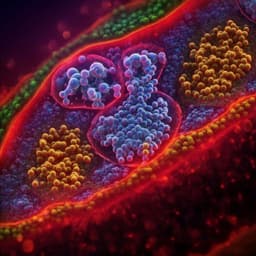
Biology
Transporter-mediated depletion of extracellular proline directly contributes to plant pattern-triggered immunity against a bacterial pathogen
C. J. Rogan, Y. Pang, et al.
Discover how plant-exuded proline serves as a strategic signal and nutrient for the bacterial pathogen *Pseudomonas syringae*. This groundbreaking research conducted by Conner J. Rogan and colleagues reveals the critical role of extracellular proline depletion in enhancing plant immunity, showcasing a potential new avenue for crop protection.
Playback language: English
Related Publications
Explore these studies to deepen your understanding of the subject.







